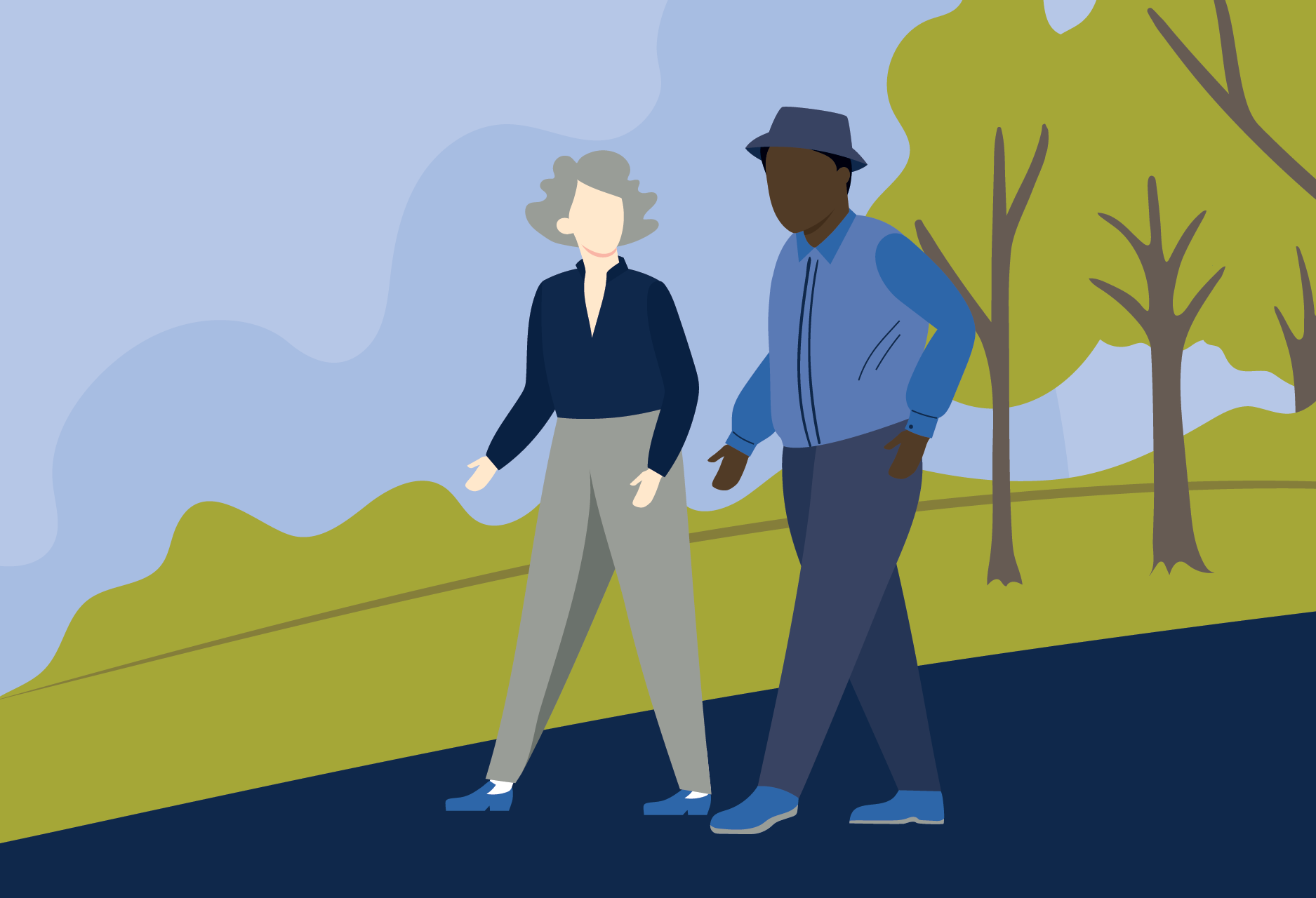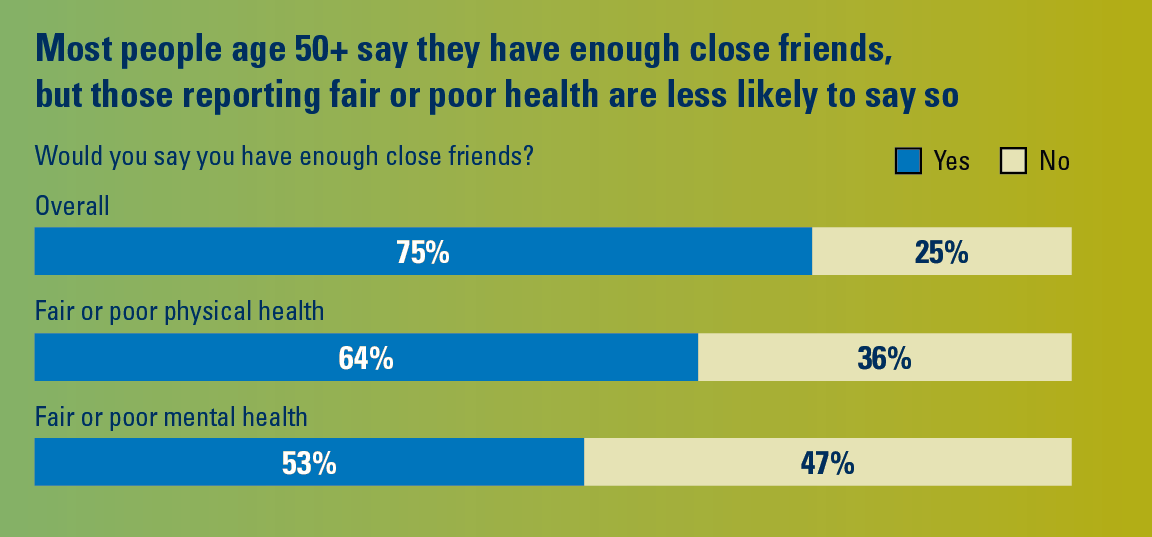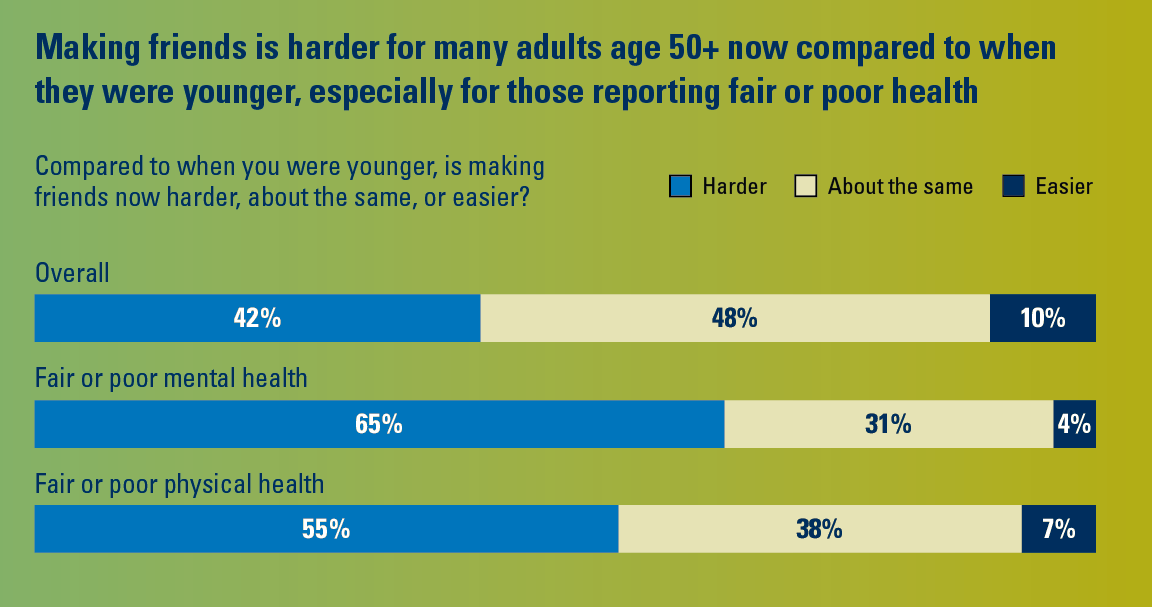
Key Findings
- 90% of people age 50 and older reported that they have at least one close friend (48% have 1-3 close friends, 42% have 4 or more), while 10% do not have any close friends.
- About half of older adults with fair or poor mental health (47%) said they do not have enough close friends.
- The majority of adults age 50 and older with a close friend (70%) said they can definitely count on their close friends to provide support in discussing their health.
Friendships are an important part of well-being and healthy aging. They help create feelings of connectedness and offer a valuable support system and social network. They can also help people live healthier lives.
However, friendships can change or be lost overtime, particularly as people age. To better understand older adults’ friendships and how they relate to health, in August 2024 the University of Michigan National Poll on Healthy Aging asked a national sample of adults age 50 and older about their close friendships, how these friends provide health-related support, their thoughts on making new friends, and how maintaining friendships may be different now than when they were younger.

Close friendships in later adulthood
Number of close friends
In all, 90% of people age 50 and older reported having at least one close friend (48% have 1–3 close friends, 42% have 4 or more), and 10% said they did not have any close friends. The proportion of older adults without any close friends was higher among those with fair or poor mental health (20%) or physical health (18%).
Men were more likely than women to report having no close friends, as were people age 50–64 compared with those age 65 and older. Similarly, older adults who said they do not have any close friends were more likely to feel isolated or a lack of companionship some of the time or often in the past year compared with those who had at least one close friend.
Overall, 75% of people age 50 and older said they have enough close friends, while 25% reported they do not have enough close friends. The percentage who said they do not have enough close friends was nearly double the overall percentage among older adults who described their mental health as fair or poor (47%). Moreover, 36% of those with fair or poor physical health felt they do not have enough close friends.
Older adults who said they do not have enough close friends were more likely than those with enough close friends to report feeling isolated or that they lacked companionship some of the time or often.
Frequency and forms of contact
When asked about frequency of contact, 23% of adults age 50 and older said they are in touch with their close friend(s) daily / almost daily, 40% at least once a week, and 36% 1–2 times a month or less. Older adults who had more frequent contact with their close friends were less likely to report a lack of companionship or feeling isolated.
The majority of people age 50 and older (72%) rated the amount of contact they had with their close friends as “about right,” while 28% said they would like more contact with their close friends. Older adults reporting fair or poor mental health were more likely to want more contact with close friends (45%) compared to those who described their mental health as excellent, very good, or good (26%).
Regarding modes of communication, in the past month, most older adults had contact with close friends in person (78%), over the phone (73%), or via text message (71%).
Close intergenerational friendships
Among people age 50 and older who reported having at least one close friend, 46% said a close friend is from a different generation, defined as being at least 15 years older or 15 years younger. Of those with a close friend from a different generation, 52% have close friends from both older and younger generations. Another 35% have friends from a younger generation only, and 13% have friends from an older generation only.
How close friends provide health-related support
Many adults age 50 and older received health-related support, encouragement, and motivation from their close friends during the past year. Among those with at least one close friend, the majority said they can definitely count on these friends for emotional support in good times or bad (79%) or for support if they need to discuss their health (70%).
Moreover, many said their close friends encouraged or motivated them in the past year to:
- make healthy choices, such as getting more exercise or eating a healthier diet (50%)
Making - get a symptom or health issue checked out by a health care provider (35%)
- stop engaging in certain unhealthy behaviors, like eating unhealthy foods or drinking too much (29%)
Older adults also reported they had a close friend who:
- helped them when they were sick or injured (32%)
- picked up medication for them (17%)
- attended their medical appointments (15%)
Making new friends
As for making new friends, 42% of people age 50 and older thought it was harder to do so now compared to when they were younger, while 10% felt it was easier and 48% thought it was about the same. The majority of older adults experiencing fair or poor mental health (65%) or physical health (55%) said it was harder to make new friends now than earlier in life.
Regarding interest in making new friends, 75% of all older adults were interested (14% very, 61% somewhat) in developing new friendships, while 25% were not interested. Older adults who lived alone and those who lacked companionship some of the time or often in the past year were more likely to be interested in making new friends. Conversely, older adults who said their physical health was fair or poor and those age 50–64 were less likely to be interested in forming new friendships.
Maintaining friendships
In all, 34% of older adults thought it was harder to maintain friendships now than when they were younger, while 12% thought it was easier and 54% thought it was about the same. The percentage of older adults who thought it was harder to maintain friendships now compared to earlier in life was highest among those reporting fair or poor mental health (61%) or physical health (47%).

Implications
Friendships play a critical role in helping older adults feel connected and supported. In this poll, we found that most adults age 50 and older have at least one close friend whom they can rely on to support their well-being in a variety of ways, from discussing their health to providing emotional support. Not having close friends can adversely affect mental health and may result in missed opportunities for support with engaging in positive health behaviors, like getting exercise, eating healthy foods, and seeking health care when needs arise.
Older adults’ health and feelings of loneliness play a role in their friendships. Our poll results show that older adults experiencing fair or poor mental or physical health were more likely to have no close friends and find it more difficult to maintain friendships and make new friends. Also, adults age 50 and older who said they felt isolated or lacked companionship were more likely to report less contact with their close friends or that they do not have any close friends at all.
The majority of older adults expressed interest in making new friends, especially those who live alone and those who report that they lack companionship. However, many feel it is harder to make new friends now compared to when they were younger. Opportunities to develop new friendships, including those with people from other generations, can provide many benefits.
For Older Adults and Their Families: Friendships provide valuable social connections for adults, yet these connections may change, be lost, or weaken as people age. Some changes more common with age, such as changes in physical mobility, can affect social activities and the ability to maintain friendships. Thus, it may be important to explore new ways to stay connected. Loved ones can support older adults in maintaining and developing new friendships by coordinating transportation, if needed, or by including loved ones in their own social activities.
For Health Care Providers: It is important to recognize the contributions of close friends to health, including the role of friends in accessing health care and encouraging healthy behaviors. Given the key role close friends can play in older adults’ lives, asking older patients about their social lives and friendships, and providing an opportunity to discuss how these relationships can and do support their health, can be a component of providing holistic care and promoting overall health and well-being.
For Community Organizations: Community organizations and local senior centers can play an important role in fostering social connections and well-being. This can include offering and facilitating inclusive and accessible activities, both structured and unstructured, that provide opportunities to connect with existing friends and make new friends.
Data Source and Methods
This National Poll on Healthy Aging report presents findings from a national household survey conducted exclusively by NORC at the University of Chicago for the University of Michigan’s Institute for Healthcare Policy and Innovation. This survey module was administered online and by phone from August 5th – 27th, 2024, to a randomly selected, stratified group of U.S. adults age 50–94 (n=3,486), with an oversample of non-Hispanic Black, Hispanic, and Asian American and Pacific Islander populations. The survey completion rate was 36% among panel members invited to participate. The margin of error is +/– 1 to 4 percentage points for questions asked of the full sample and higher among subgroups. Findings from the National Poll on Healthy Aging do not represent the opinions of the University of Michigan. The University of Michigan reserves all rights over this material.
Read other National Poll on Healthy Aging reports and about our Michigan findings, and learn about the poll methodology.
For interactive data tables, see https://michmed.org/4eGeJ
Citation
National Poll on Healthy Aging Team. The Value of Friendships as We Age. University of Michigan National Poll on Healthy Aging. December 2024. Available at https://dx.doi.org/10.7302/24852